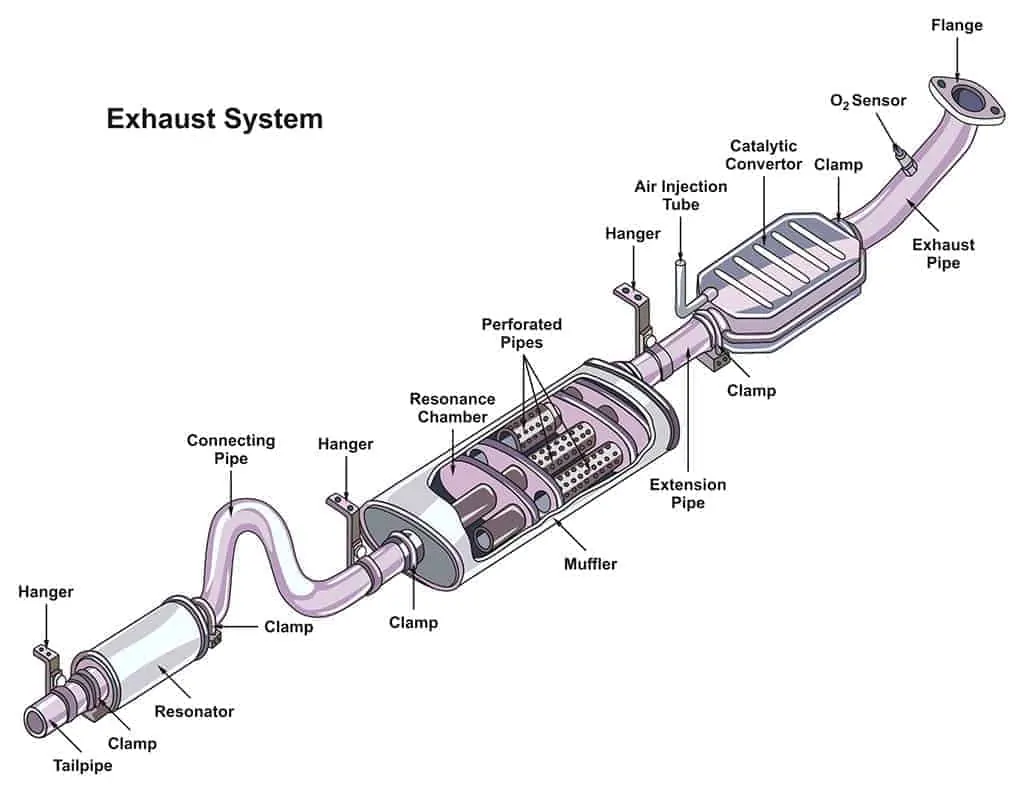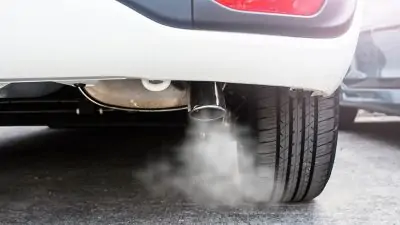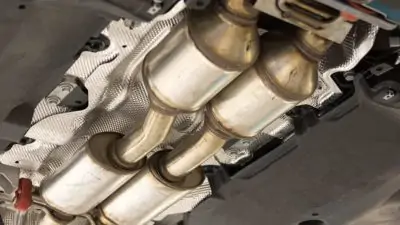Table of Contents
Your car’s exhaust system is responsible for carrying the byproducts of the engine’s combustion process from the engine to the back of the car where it can be released into the atmosphere. This is important because if these fumes and toxins are released into the passenger compartment, it can cause illness, and in extreme cases, death.
The other function of the exhaust system is to reduce the noise produced by the engine, which is quite loud, however, most people forget this until they pass a vehicle with a leak in the muffler or exhaust system.
Here is an illustration of what your car’s exhaust system might look like:

The exhaust system starts with the exhaust manifold which is attached to the engine’s cylinder head. There is a gasket between the manifold and the cylinder head which can fail, causing a leak. This leak is often indicated by an increase in noise coming from under the hood when the car is running.
Exhaust pipes (usually made of steel) connect each component in the exhaust system and uses clamps to secure these connections. The complete system is secured to your vehicle by a series of hangers. The connected exhaust system components include:
Catalytic Converter – This is an emissions control device within your exhaust system that converts unburned fuel and harmful gases into environmentally friendly elements such as carbon dioxide and water. It is for this reason that you often can see water coming out of a tailpipe. The catalytic converter can become damaged if the engine fails in such a way that excess coolant or oil passes through the exhaust system and reaches the catalytic converter. Under normal circumstances, a catalytic converter will last for the life of the car.
Muffler – The muffler serves to reduce noise coming from the exhaust system and contains a series of chambers and tubes used to dampen the sound. On newer cars, a muffler will often last for the normal lifespan of the vehicle. In many cases, the muffler will need to replace, with rust being the most common factor in a muffler deteriorating.
Resonator – Also known as a “pre-muffler”, a resonator is found on some vehicles and is used to help with sound dampening by eliminating certain exhaust frequencies.
Lastly, but not to be forgotten is the Oxygen Sensor (also known as the O2 sensor) which is also an emission control component. This sensor detects the percentage of oxygen in the exhaust and signals the car’s computer (or electronic control module) letting it know whether or not to increase or decrease the amount of fuel it is sending into the engine via the fuel injectors. The oxygen sensor is often mounted on the exhaust manifold and in some cases, more than one oxygen sensor is used in a vehicle.
Exhaust System Repairs We Perform:
- Muffler Replacement
- Exhaust Leak Diagnosis
- Catalytic Converter Replacement
- Oxygen Sensor Replacement
- Exhaust Pipe Replacement
- Exhaust Manifold Replacement
- Custom Exhaust Work
Ready to Make An Appointment For Your Exhaust System Repair?
At Kneble’s Auto Service Center we always want to make the process of getting your car serviced as convenient as possible. To ensure that we can get your car serviced in a timely manner, we ask that you make an appointment.
We are able to accommodate those who desire to wait for their exhaust system repairs, as we feature a comfortable waiting area complete with TV, complimentary refreshments, a library, desk, and a charging station. And yes, we even have free Wi-Fi!
If you need service and have not made an appointment you can always feel free to call us at (609) 625-3286 to get on the schedule.
Please note that we offer a shuttle service within a 10 miles radius of the shop (Estell Manor, Somers Point, Cologne, Galloway, and surrounding areas).
Frequently Asked Questions About Exhaust Systems:
Yes, one of the byproducts of the engine’s combustion process (i.e. burning fuel) is the production of water. It is not uncommon to see water drip from the muffler or the tailpipe, especially when the vehicle is first started and the exhaust system is not at full operating temperature. If you ever see a constant flow of water (or worse antifreeze or oil) that is not normal and could be a sign of serious engine damage.
This is most likely caused by a leak somewhere in the exhaust system and it is CRITICAL that you have the car inspected as soon as possible by one of our ASE Certified Technicians, as exhaust leaks can be extremely hazardous to your health.
There is certainly a chance that the sound is coming from your exhaust system, as some exhaust systems include metallic shields to insulate the car from the heat of the exhaust system. These shields can come loose or even collect rocks in them that can make noise as you drive. The best course of action is to have one of our ASE Certified Technicians inspect the vehicle to find the exact source of the noise.
Schedule an Appointment for Your Exhaust System Repair
Exhaust System Knowledge Base
Exhaust System Videos
Exhaust System Articles
Car Exhaust Fumes: Where Do They Come From and Are They Harmful?
Are you dealing with exhaust fumes in your vehicle? Learn about the hazards of the fumes to your health & what to repair on your vehicle now!
Comparing OEM Catalytic Converters vs. Aftermarket Catalytic Converters
Learn about your catalytic converter and the differences between OEM vs. Aftermarket catalytic converters to see which we recommend today!
Where to Get Your Vehicle’s Exhaust System Repaired?
Our Address
5473 Somers Point Road
Mays Landing, NJ 08330
Our Hours
Monday – Friday: 8:00am – 5:00pm
Saturday:
8:00am – 4:00pm
Sunday: Closed









